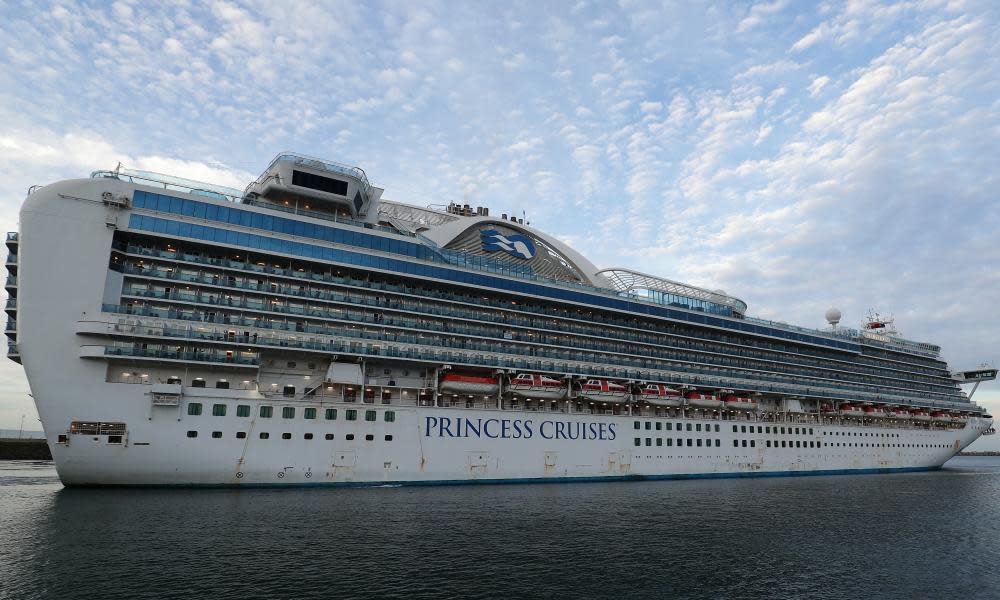Ruby Princess: Gladys Berejiklian refuses calls to extend inquiry to hear from official who refused to appear

Gladys Berejiklian has rebuffed calls to extend the Ruby Princess inquiry to hear from federal officials who have refused to appear, as Labor accuses Scott Morrison of breaching a promise of full cooperation.
The shadow attorney general, Mark Dreyfus, has written to Christian Porter demanding an explanation of the government’s decision to refuse to comply with a summons for an agriculture department official to appear at Bret Walker’s inquiry. The cruise ship was responsible for hundreds of Covid-19 cases and at least 22 deaths.
On Thursday, the home affairs minister, Peter Dutton, claimed the government “had cooperated” because it provided a written submission, and angrily defended the actions of Border Force officers, despite the revelation one gave verbal authorisation for passengers to disembark and mistook negative flu test results for Covid-19 results.
In April, Morrison was asked to guarantee the commonwealth would fully cooperate with the NSW government-commissioned inquiry into the Ruby Princess debacle and not take steps to stymie Walker getting evidence from federal agencies.
Related: Ruby Princess inquiry: how distractions and mistakes led to a ‘catastrophic’ Covid-19 cluster
“We always cooperate with royal commissions,” the prime minister replied.
On 3 August, Labor’s Kristina Keneally wrote to the New South Wales premier saying she was “concerned” the Morrison government then refused to allow Walker to call an agriculture department biosecurity official.
Keneally suggested Berejiklian consider giving the inquiry more time to “adequately consider” new documents about the confusion of flu and Covid-19 test results and “any additional witnesses Commissioner Walker may wish to call”.
She also called on the premier to personally lobby Morrison to reconsider blocking commonwealth officials from providing evidence. Walker is due to report on 14 August.
Berejiklian replied on Thursday that Walker “has the power … to excuse a witness from attending a special commission” – a reference to the fact Walker has now formally excused the agriculture official from his earlier demand to appear due to the commonwealth’s refusal.
“As you will appreciate, the commissioner is independent in the conduct of the inquiry,” she said.
“The matters that have been raised in your letter, including the extension of time, are therefore matters for the commissioner.”
On Thursday, Morrison and Dutton were asked why the government resisted a summons from Walker and whether Border Force would have allowed 11 self-isolated passengers to leave the Ruby Princess if not for the confusion of test results.
Morrison directed the question to Dutton, who claimed “we have cooperated, we’ve provided a submission to the inquiry”.
Dutton cited “precedent in history in relation to commonwealth and state inquiries” – a reference to the commonwealth’s belief that compulsion to appear at a state inquiry improperly interferes with the federal public service.
Walker himself cast doubt on that claim in his Murray-Darling Basin royal commission report, arguing the relevant constitutional doctrine “is not, to put it mildly, thoroughly well worked out in the authorities”.
Dreyfus has also angrily rejected the defence – writing to Porter that it is “irrelevant that the commonwealth does not consider that the special commissioner’s coercive powers apply to it or its officers”.
“The prime minister promised full cooperation. Your government refused to provide full cooperation.
“That is deeply troubling – not just because it is at odds with the commitment made by the prime minister, but also because it betrays a troubling attitude to basic notions of accountability.”
Dreyfus called on Porter to explain “honestly and clearly” why the commonwealth refused to allow its officers to give evidence.
On Thursday, Dutton went on to say any suggestion of “wrongdoing” by the Australian Border Force was “completely wrong” and that he would not allow officers to be “besmirched”.
“Now, the Australian Border Force does not have a role in relation to clearing people on health grounds.
“We do not employ doctors and nurses at airports or at seaports.”

 Yahoo News
Yahoo News 
